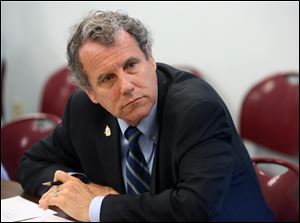
Brown talks NAFTA on day Fostoria plant stops production
2/3/2018
U.S. Sen. Sherrod Brown
On the same day that U.S. Sen. Sherrod Brown was at a Toledo union hall talking with area labor and business leaders about the ongoing renegotiation of the North American Free Trade Agreement, Fostoria’s Autolite spark plug factory was running its production line for the final time.
The plant, already reduced to a shell of its former position as the city’s top employer by rounds of layoffs and outsourcing, eliminated 35 of its remaining 40 jobs on Friday.
Bob Teeple, who was until recently president of United Auto Workers 533, said a skeleton crew will remain for a short time to finish the shutdown. But no longer will the factory, which once boasted more than 1,000 employees, make anything.
“It’s going to be an empty building, just like a bunch of them in Fostoria,” Mr. Teeple said.
The timing was coincidental — Mr. Brown, a Democrat representing Ohio, hadn’t known the specifics of Friday’s closure prior to Mr. Teeple mentioning it — but Autolite’s closure serves as a parable for what opponents of NAFTA say the trade agreement has done to industry in northwest Ohio.
“Look at the story of Autolite, which promised NAFTA would mean more jobs and it ended up just eviscerating the plant,” Mr. Brown said in an interview prior to the roundtable. “Look at what’s happened overall in the auto industry.”
In 2007, then-owner Honeywell International Inc. cut more than 500 jobs at the Autolite plant when it sent a portion of the work that had been done there to Mexico. Honeywell later sold the Autolite brand to Rank Group Ltd., a private investment firm, which folded Autolite into its automotive subsidiary Fram Group.
A message left with Fram was not returned on Friday.
Critics of NAFTA, including Mr. Brown, argue the 24-year-old free trade agreement has pushed down wages for U.S. employees, led to rampant outsourcing, and devastated Midwestern factory towns.
Representatives from the U.S., Canada, and Mexico have been meeting to talk about the deal’s future for months. It’s not clear when those talks might conclude.
President Trump has even suggested the U.S. could unilaterally pull out of NAFTA, though various reports have warned of near-immediate job losses if that were to happen.
A January study from the Trade Partnership Worldwide commissioned by the conservative-leaning Business Roundtable warned a pullout could cost 1.8 million jobs within the first 12 months, including 64,000 in Ohio.
Mr. Brown has not gone so far as calling for the elimination of NAFTA, but he is a strong proponent of reworking aspects of the deal.
He said he and his office have been in regular contact with U.S. Trade Representative Robert Lighthizer, and have advocated a four-part plan for the negotiation. The plan entails securing anti-outsourcing and “buy American” provisions, making sure not to pit workers and industries against each other in negotiations, ensuring enforcement tools favor American workers, and giving U.S. workers a voice in negotiations.
“You’ve gotta make sure workers are represented in the way this is written, that it’s not just for companies that outsource,” Mr. Brown said.
At Friday’s roundtable — which also included union officials who represent skilled trades workers and automotive workers, Toledo Mayor Wade Kapszukiewicz, North Baltimore Village Administrator Allyson Murray, and officials from Whirlpool Corp., Toledo Ticket, and Owens-Illinois — the senator said he was looking to gather feedback.
And not everyone on the panel had a negative view of NAFTA.
Jim Seiwert, the global director for grants incentives at Owens-Illinois Inc., noted that the Perrysburg-based bottlemaker has plants and customers in all three of the member nations.
“We support NAFTA because we want cross-border abilities,” Mr. Seiwert said. “We manufacture products in the U.S. that go to Mexico. We make products in Canada that come to the U.S.”
One of O-I’s major Mexican customers, for example, buys beer bottles made in Texas, fills them, then sends many of the full bottles back to the United States. Were NAFTA to go away, O-I’s costs would increase, he said.
As for the plant in Fostoria, local officials are hopeful it can be repurposed. Renee Smith, president of the Fostoria Economic Development Corporation, said there’s already been interest in the facility.
“There’s a tremendous amount of potential at that site,” she said in a phone interview.
Mr. Teeple said the union had been able to negotiate a severance agreement with ownership and said many workers who were being laid off Friday have already lined up new jobs.
“Some of them even better jobs,” he said. “On the downside, we used to have 1,000 people working there. It was like a city.”
Contact Tyrel Linkhorn at tlinkhorn@theblade.com, 419-724-6134, or on Twitter @TyrelLinkhorn.